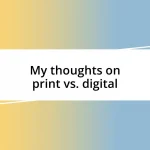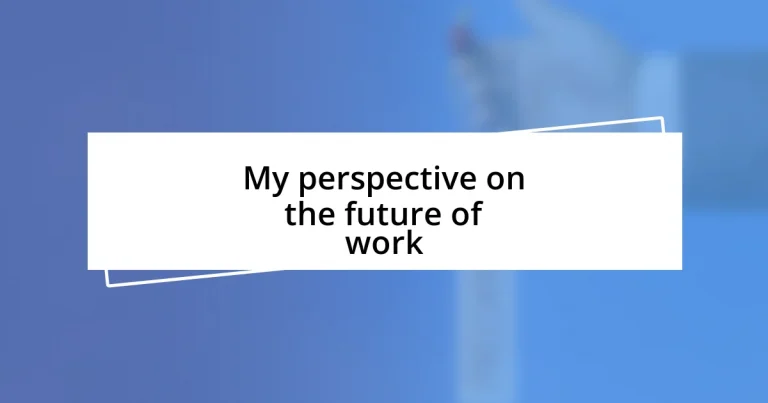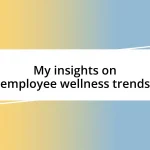Key takeaways:
- Remote work represents a major shift in work-life balance, valuing flexibility and adaptability over traditional structures.
- Key trends shaping the future workplace include increased remote work, a focus on mental health, diversity and inclusion, skill development, and hybrid work models.
- Essential skills for future jobs include adaptability, emotional intelligence, and technical proficiency, emphasizing the importance of ongoing learning and communication.
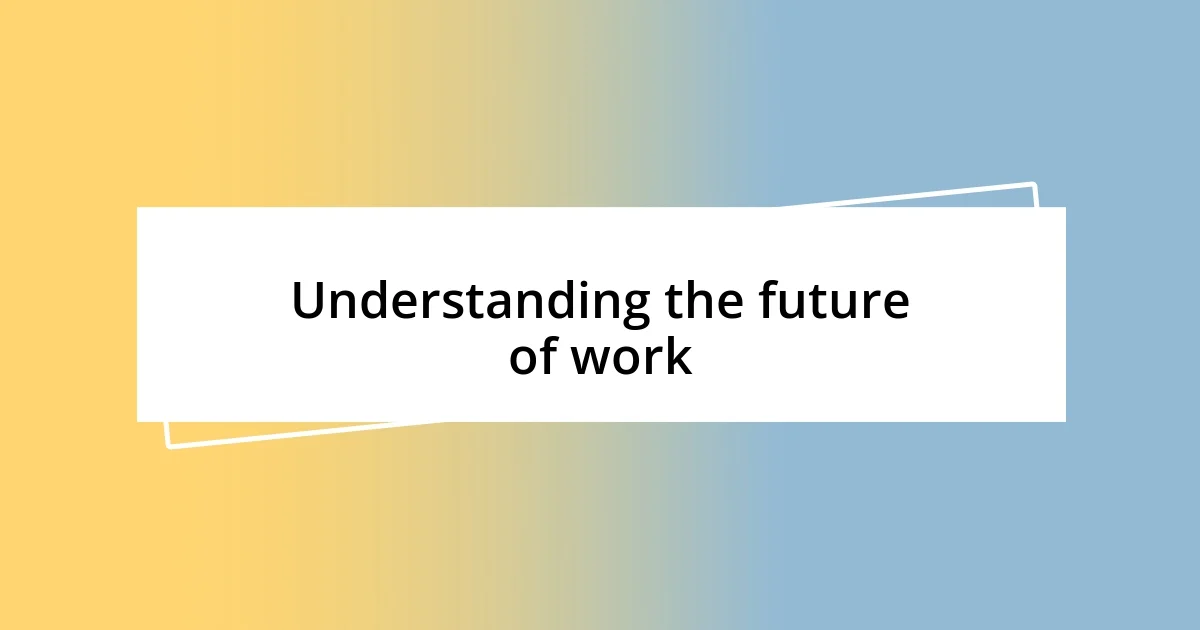
Understanding the future of work
The future of work feels like an unfolding tapestry, each thread representing a different possibility. I often wonder how many of us are ready to adapt to a landscape that constantly shifts beneath our feet. Reflecting on my own experiences, I recall the moment I realized that remote work wasn’t just a temporary solution but a long-term shift. It changed how I perceive work-life balance, raising questions like: How do we value productivity when the lines between our home and professional lives blur?
As I engage with colleagues in hybrid settings, I see a growing emphasis on collaboration tools and flexible schedules. This evolution sparks memories of my first online meeting, where I struggled to navigate the technology while trying to connect with my team. The awkwardness was real, but it taught me that embracing these innovations fosters a culture of inclusivity. How can we create environments that thrive on diverse input when everyone’s situation varies?
I believe one of the most remarkable aspects of this transformation is how it’s pushing us to rethink our skills. For instance, I’ve noticed a shift from traditional expertise to a more holistic view that values emotional intelligence and adaptability. It compels me to ask: Are we equipping ourselves for this new era of teamwork and individual expression? As we ponder these questions, it becomes clear that understanding the future of work isn’t just about the mechanics; it’s about nurturing a mindset that cherishes growth and connection amidst change.
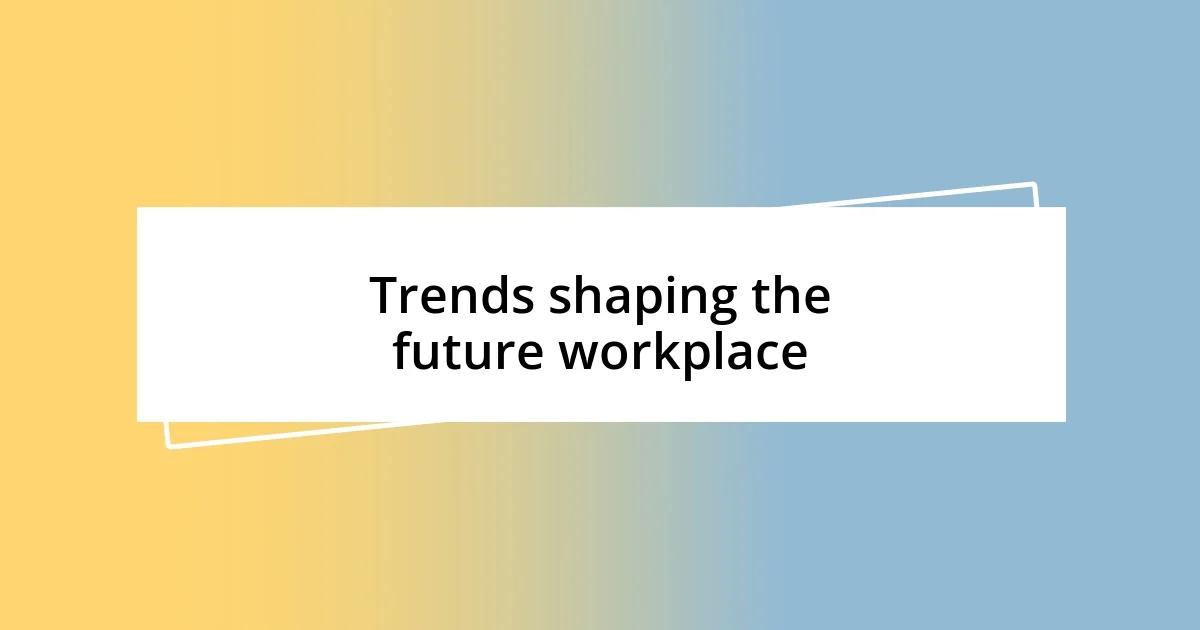
Trends shaping the future workplace
As I observe the landscape of modern workspaces, it’s evident that technology continues to redefine our professional interactions. For example, during one of my recent brainstorming sessions aboard a co-working space app, I was amazed at the seamless integration of digital whiteboards and instant messaging. It reminded me of how far we’ve come from the days of scribbling ideas on sticky notes in a conference room. This tech-enabled flexibility is reshaping team dynamics, and I can’t help but feel excited about collaborating in real-time, regardless of where we are physically located.
Key trends shaping the future workplace include:
- Increased Remote Work: More organizations are embracing remote work as a viable long-term solution, creating a more inclusive environment.
- Focus on Mental Health: Companies are prioritizing mental well-being, offering resources to help employees manage stress and maintain a healthy work-life balance.
- Diversity and Inclusion Efforts: There’s a growing recognition of the importance of diverse perspectives, leading to initiatives that boost inclusivity across teams.
- Emphasis on Skill Development: Businesses are investing in reskilling and upskilling employees to keep pace with technological advancements and changing market needs.
- Hybrid Work Models: The fusion of remote and in-office work is becoming the norm, promoting flexibility while fostering collaboration.
Reflecting on these trends, I can’t help but feel a blend of hope and apprehension. I’ve seen first-hand the challenges some colleagues face when adapting to new technologies. I recall a team member expressing her frustration with virtual collaboration tools. Together, we navigated those challenges, and witnessing her growth reinforced my belief in the potential for positive change. I see the future workplace as an interconnected web, and I’m curious about how these trends will evolve our experiences and relationships in the professional realm.
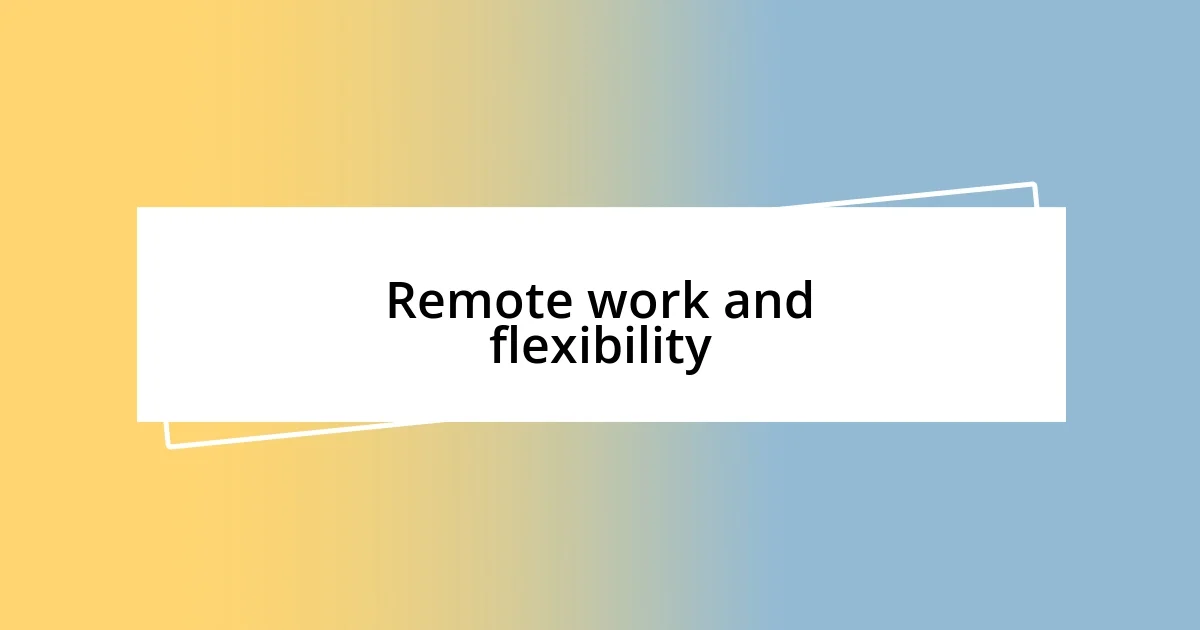
Remote work and flexibility
Remote work has become a driving force in how we approach our professional lives, offering unprecedented flexibility. I remember the first time I worked from home during a blizzard; it felt liberating to set my hours, even if it came with its own distractions. It made me realize that flexibility isn’t just about location; it’s about how we can mold our work routines to better fit our lives.
Moving towards hybrid work models, I’ve seen a shift in how teams communicate. In my experience, virtual coffee breaks have become essential for maintaining connections and building camaraderie among remote colleagues. Those informal moments are incredibly important; they bring a human touch to digital interactions that can sometimes feel too formal.
As we navigate this new era, the emphasis on work-life balance has never been more evident. Reflecting on my own routines, I’ve been inspired to prioritize self-care amidst deadlines. The beauty of remote work is finding that rhythm, carving out time for family, hobbies, or even just a quiet moment to recharge. It’s a delicate dance that we are all learning together, and I believe it has the power to reshape our understanding of productivity and fulfillment.
| Aspect | Remote Work | Traditional Office Work |
|---|---|---|
| Location | Flexible, from home or anywhere | Fixed, in a designated office |
| Work Hours | Adjustable based on personal preference | Set hours, usually 9 to 5 |
| Communication | Primarily virtual, with tools like video calls | Face-to-face interactions |
| Work-Life Balance | Enhances ability to balance personal and professional life | Can blur boundaries between work and personal time |
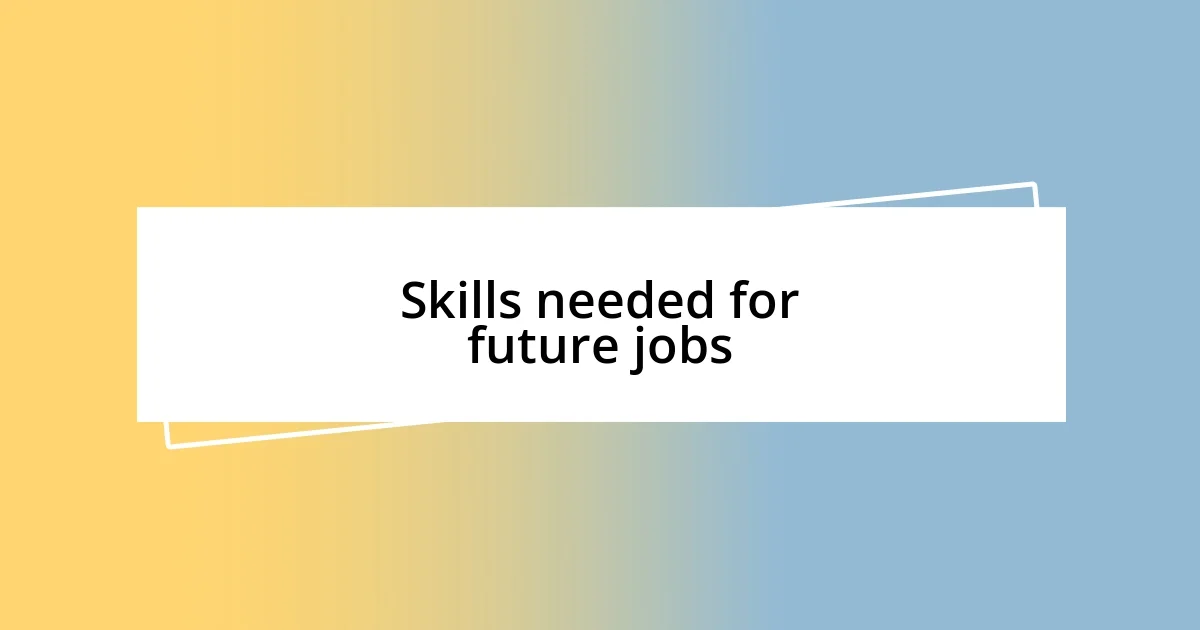
Skills needed for future jobs
To thrive in the future job market, I believe adaptability will be paramount. I’ve encountered situations where learning new software during a project felt overwhelming. Yet, my determination to embrace those changes often led to surprising breakthroughs. That taught me the value of being open to learning—it’s not just about overcoming obstacles but using them as stepping stones for growth.
Another crucial skill is emotional intelligence, which I’ve come to appreciate more in team settings. During a challenging project, I noticed how empathy fostered trust among team members, leading to more effective collaboration. Can you remember a time when a genuine conversation changed the course of a project? Those moments highlight that understanding our colleagues’ feelings is just as important as our technical skills.
Lastly, technical proficiency cannot be overlooked. I vividly recall diving into data analytics for the first time—it felt intimidating but also exciting. By embracing this challenge, I unlocked a new way of interpreting our team’s performance. As we move forward, I see constant learning in technology as an essential skill, turning what once seemed daunting into an empowering opportunity. How do you plan to enhance your skills in embracing technological changes?
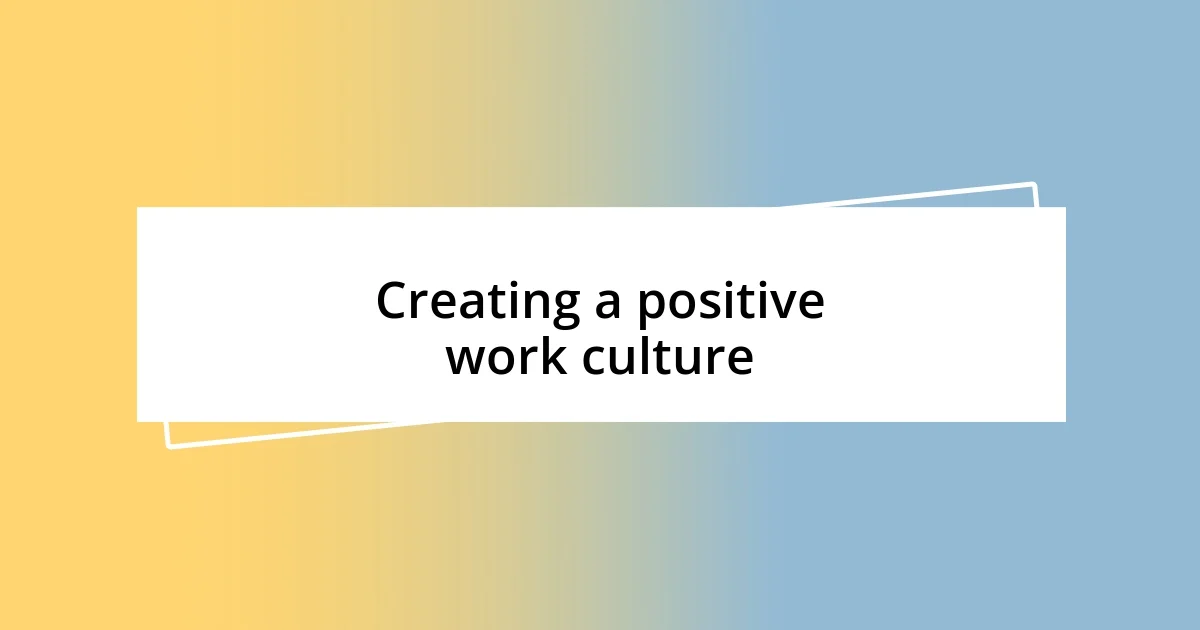
Creating a positive work culture
Creating a positive work culture hinges on open communication and trust. I remember when I was part of a team that held regular feedback sessions, both informal and structured. Those conversations transformed our work environment; we became more supportive and innovative. Have you ever experienced a shift in morale after just a few heartfelt discussions?
Another key aspect is celebrating successes, no matter how small. At my last job, we developed a routine of recognizing individual achievements in team meetings. It not only boosted confidence but also encouraged everyone to push their limits. Doesn’t it feel gratifying when your efforts are acknowledged by peers?
Lastly, fostering inclusivity plays a pivotal role in shaping a supportive atmosphere. I’ve been in environments where diverse perspectives were not just welcomed but actively sought out. The creativity that emerged from those discussions was inspiring, making me realize how valuable every voice can be. How do you create space for different opinions in your workplace? Embracing inclusivity might just be the secret ingredient to a thriving culture.
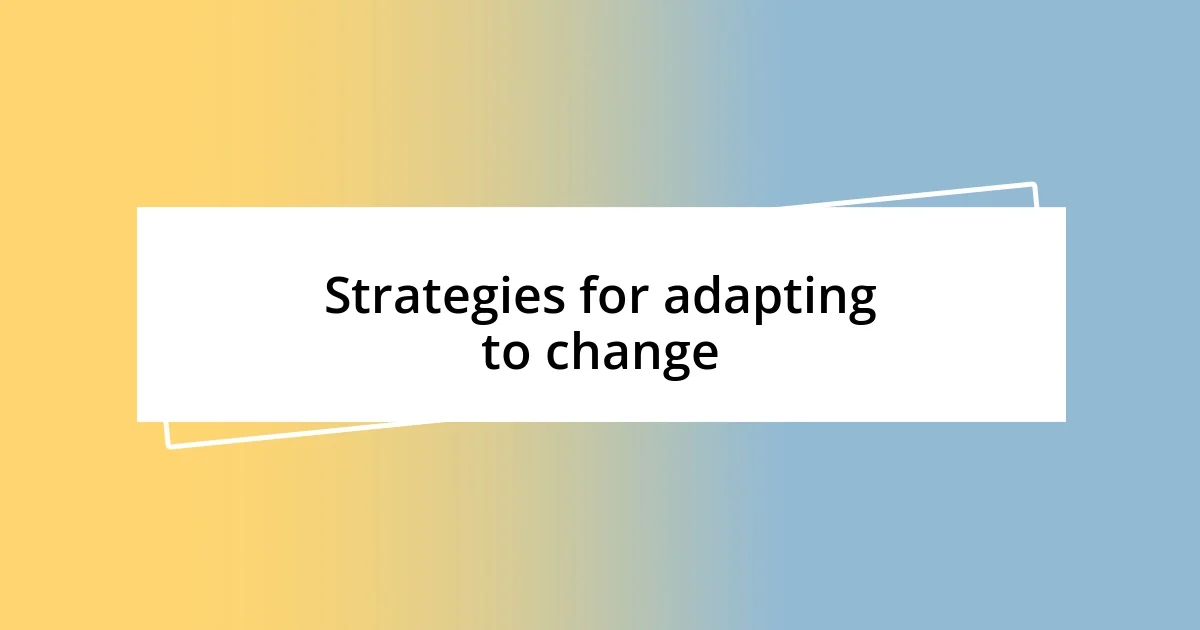
Strategies for adapting to change
Adapting to change requires a mindset shift that I believe we all need to cultivate. I recall a time when my company suddenly transitioned to remote work. Initially, it felt disorienting, but I realized that embracing flexibility was crucial. Have you ever found yourself in a similar situation where you had to rethink your daily routine? It taught me that being proactive, rather than reactive, is vital in navigating change.
Another strategy I’ve found beneficial is seeking continuous feedback. In my previous role, I made it a point to connect regularly with my manager for insights on my progress. These discussions not only clarified expectations but also provided me with an opportunity to voice my concerns. Have you considered how open dialogue could help you adapt in your work environment? It’s those moments of honest conversation that can guide us through uncertainty.
Lastly, I can’t stress enough how valuable a supportive network can be. During a particularly challenging project, I reached out to a mentor who had weathered similar storms. Her advice and encouragement were instrumental in helping me adjust my approach. Have you tapped into your network when facing changes? This experience underscored the importance of relationships; they can provide you with wisdom and perspective, making adjustments feel less daunting.








